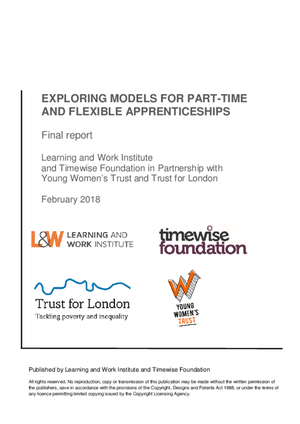Apprenticeships are seen by the Government as a key vehicle to support transition to the labour market, social mobility, economic growth and improved productivity. An ambitious reform programme is underway to raise the quality and quantity of apprenticeships, funded in part by the new Apprenticeship Levy which has also catapulted apprenticeships to the top of the agenda for many businesses.
This agenda offers an opportunity to reverse the long-term decline in employer investment in training and open up new opportunities for employees to access and progress in skilled jobs. While evidence shows that the benefits of apprentices, to businesses and to our wider economy and society are considerable, too many people are missing out and access to high-quality apprenticeships. Gender segregation is entrenched, mirroring the inequalities in the labour market that see women over-represented in low-paid, low- skilled jobs. For those needing to work and train part-time or flexibly – such as parents with young children, single parents, carers, care leavers, and those with disabilities – the options can be limited when the majority of apprenticeship opportunities are offered on a full-time basis.
This paper investigates the feasibility and scalability of part-time and flexible models of apprenticeships. It is based on research conducted by Learning and Work Institute and Timewise with learners and employees with commitments that make the traditional full-time model untenable, and with employers, training providers, and other key stakeholders.
The findings suggest that part-time and flexible apprenticeship opportunities can be effective ways of both increasing access for new starters to apprenticeships and enabling existing staff to upskill. This will widen the talent pool for employers and has the potential to increase productivity. An effective flexible and part-time apprenticeship programme would include the following critical success factors:
-
Working with employers to understand their workforce needs and where part-time and flexible apprenticeships may be beneficial.
-
Communicating the opportunities and demand for part-time and flexible apprenticeships. There is a mismatch between employer, provider, and potential apprentices’ understanding of opportunities and respective demand for part-time and flexible apprenticeships. Providers do not perceive a demand from employers, and employers do not think providers offer them and often rely on staff to communicate part-time or flexible needs either at interview or subsequently (rather than building this into job adverts).
-
Focusing initially on sectors and occupations where some degree of part-time or flexible working is already established. In addition, a focus on areas that have skills gaps and recruitment difficulties could ensure that there is a business case for employers to adopt strategies to attract a wider pool of talent, as well as benefiting learners with flexible work and training needs.
-
Managers overseeing the apprentices should be engaged in decisions about how work and study will be organised, with the terms of hours and flexibility agreed upfront
-
Ensuring the level of apprenticeships offered are appropriate for the individual, of a high quality, and offer real progression opportunities and wage returns. Concerns exist about the viability of part-time Higher and Degree Level Apprenticeships, which could take up to 8 years when completed part-time. At the same time, concerns also exist about the quality of Intermediate (Level 2) Apprenticeships in some sectors. As such, for those already in work we suggest that Advanced (Level 3) Apprenticeships offer an appropriate balance between concerns about quality and duration. For those entering the workforce we recommend exploring Intermediate Apprenticeship opportunities in sectors and occupations offering better wage returns and how subsequent progression opportunities to Level 3 (and beyond) can be built into the model.
-
Ensuring that apprentices taking up part time and flexible opportunities are paid at least the Living Wage or London Living Wage. Whilst this is important for all apprentices, and we do not advocate rates of pay for part-time apprenticeships over and above other apprenticeships, it is particularly important to ensure that part-time apprentices, or apprentices employed on a flexible basis, do not face a ‘participation penalty’. Evidence shows that low-pay in apprenticeships acts as a critical barrier and this is likely to be of even greater concern for part-time workers. Since financial viability of an apprenticeship will be a key consideration (particularly those with dependents and caring commitments); being paid at least the Living Wage or London Living Wage will be a crucial enabling factor for participation. In addition, ongoing financial capability support and training throughout may be a key factor in supporting retention on part-time and flexible apprenticeships.
-
Exploring flexible timetabling and blended learning programmes that make better use of online and distance learning approaches to facilitate part-time and flexible apprenticeship models, while retaining the benefits of face-to-face and peer group learning valued by learners.
-
Involving employer and employee representatives in the design of the pilot to ensure part- time models of delivery meet the needs of both.
We now intend to seek partners and funding to use these insights, and the more detailed findings set out in this report, to develop and pilot part-time and flexible apprenticeship models in London. The pilots will be evaluated and a final report will be published with the findings and practical guidance for those interested in implementing similar models. The report will also consider any wider implications for policy and practice. Our goal is to build an evidence base to support a scalable part-time and flexible apprenticeship offer and influence how the Government is sharing information and guidance about apprentices.

22 February 2018